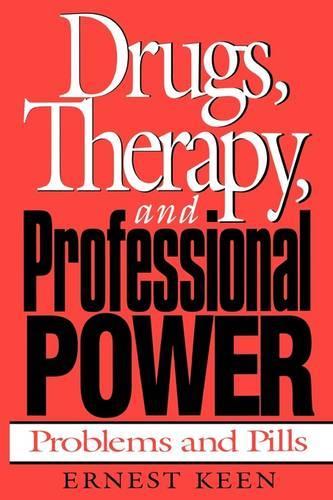
Drugs, Therapy, and Professional Power: Problems and Pills
(Hardback)
Publishing Details
Drugs, Therapy, and Professional Power: Problems and Pills
By (Author) Ernest Keen
Bloomsbury Publishing PLC
Praeger Publishers Inc
30th May 1998
United States
Classifications
Tertiary Education
Non Fiction
Psychotherapy
Public health and preventive medicine
615.788
Physical Properties
Hardback
248
Description
The current practices of prescribing psychotropic drugs, according to Keen, are both inconsistent and irrational. Overprescription alone is epidemic, and is driven largely by popular demand and professional convenience. The fact that mental life is being affected with physical agents leads to theoretical complexities no simpler than the metaphysics of mind-body relationships. These deeper questions are being ignored, Keen asserts, in favor of pragmatic attitudes driven by convenience, cost, popular demands, insurance protocols, and theoretical preferences. Keen first examines some of the reactions of psychiatry to the advent of pharmacotherapy. Parallels to the enthusiasm with lobotomy and deinstitutionalization are then explored. He argues that the treatment of the mentally ill must find some other way to mix pharmacotherapy with psychotherapy, for the theoretical and assumptive basis of the treatment profession is not settled. He asks how we can understand chemicals and experiences in the same theoretical framework, who exactly ought to prescribe, and whether ritual and placebo aspects of what is done by therapists are as likely to determine outcome as are chemical factors. In the last section of his book, Keen analyzes the implications of these issues for the rest of American society. A controversial book that will be important reading for teaching as well as practicing psychologists.
Reviews
"Drugs, Therapy and Professional Power transports the reader into a world of drugs and psychiatric medications and the realization that politics, power, status, and economics conspire to make drug creations and prescriptions attractive, covering over underlying moral and ethical standards. Perhaps this book will enter into the current stream of concern regarding issues of drugs and consciousness and serve as a catalyst in awakening a return to values, habits, and ways of being that generate natural, internal medicines and a healthy consciousness. This is a valuable addition to current works in psychopharmacology."-Clark Moustakas Center for Humanistic Studies Detroit, Michigan
"Keen accepts the premise that psychotherapists are inevitably involved in a moral enterprise. But the current emphasis on psychopharmacology and biologically reductive approaches to therapy can result in violence to the patient rather than compassionate care. Keen's philosophical and historical sophistication forces him to the conclusion that the mind-body problem is still very much alive, and that unacknowledged dualistic thinking leads to violence. This book is an eloquent and informed call for a return for compassion to psychotherapy--for recognition of the sacredness of persons."-Karl Scheib Wesleyan University
"This book should be read by every mental health professional (and by potential patients) who entertains the notion that medicating the brain is free of moral implications."-Theodore R. Sarbin Emeritus Professor of Psychology and Criminology University of California, Santa Cruz
Considering the fact that the mental health professions are in the throes of a serious moral and identity crisis, this book which examines and explicates this crisis in depth and detail, is most welcome....This is a book I applaud for its boldness, clarity of vision, and moral indignation. I enthusiastically recommend it to my colleagues.-Journal of College Students Psychotherapy
The author sheds a great deal of light when describing the operations of this complex and subtle ways in which it controls and subverts scientific discourse.-Journal of the History of Behavioral Sciences
"The author sheds a great deal of light when describing the operations of this complex and subtle ways in which it controls and subverts scientific discourse."-Journal of the History of Behavioral Sciences
"Considering the fact that the mental health professions are in the throes of a serious moral and identity crisis, this book which examines and explicates this crisis in depth and detail, is most welcome....This is a book I applaud for its boldness, clarity of vision, and moral indignation. I enthusiastically recommend it to my colleagues."-Journal of College Students Psychotherapy
Author Bio
ERNEST KEEN is Professor of Psychology at Bucknell University. He has served as a psychological consultant and a clinical psychologist in addition to his writing and teaching. He has published three earlier books as well as numerous articles.
